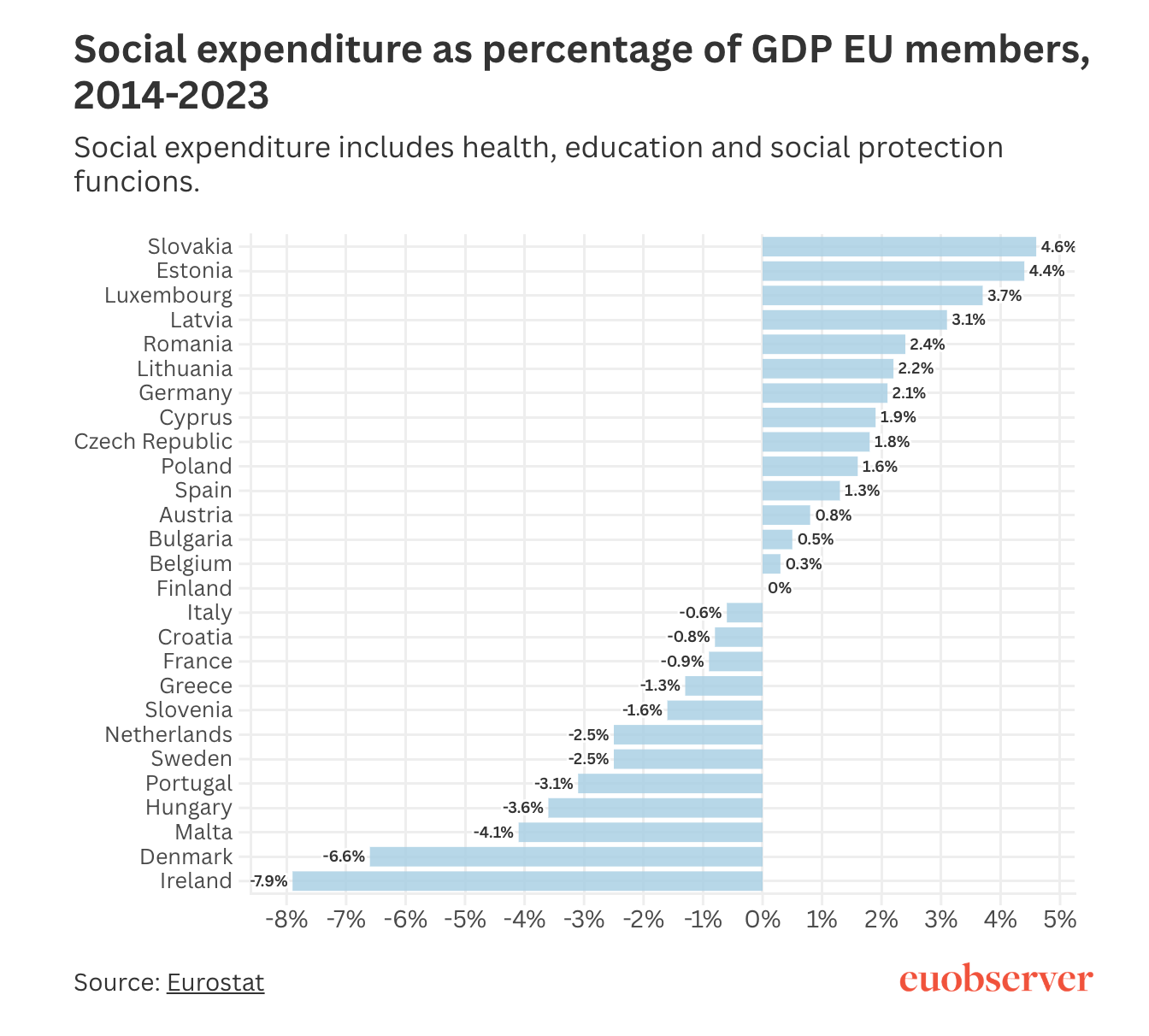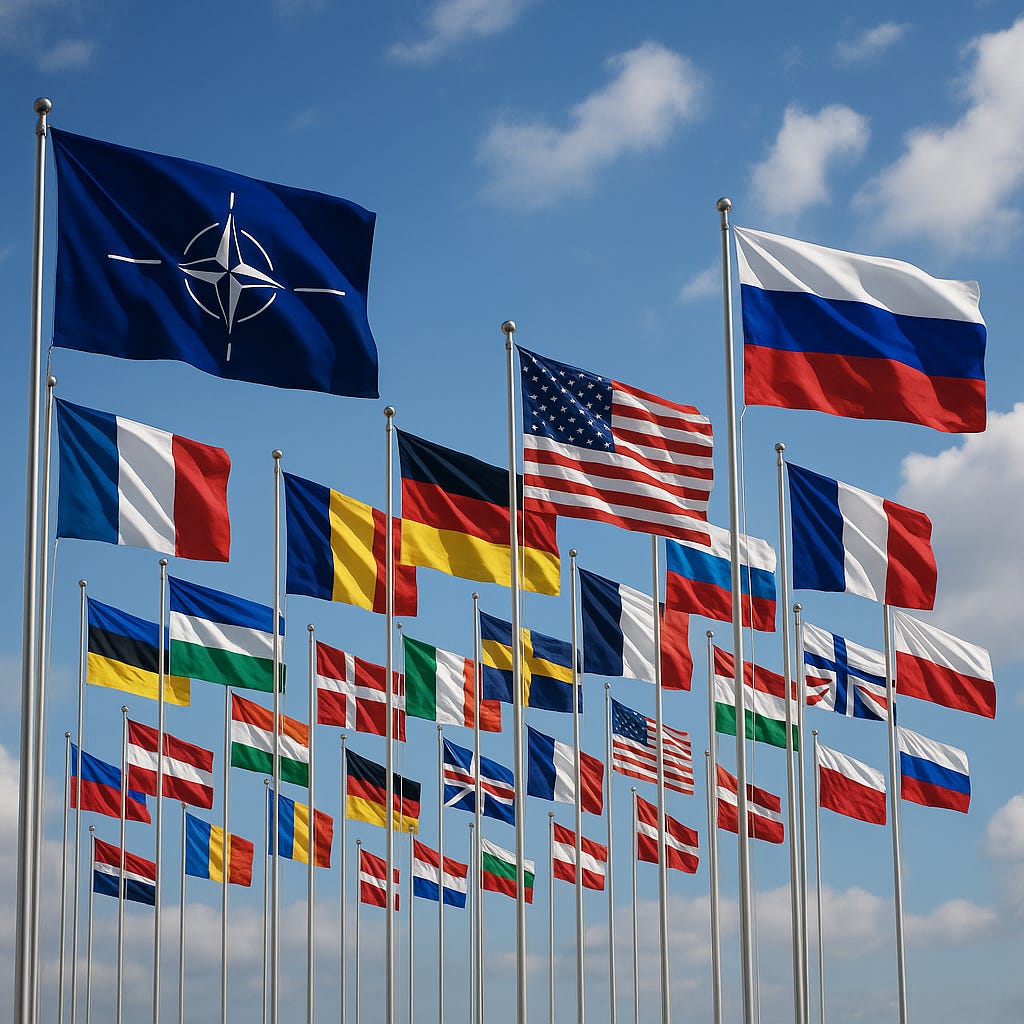The St. Petersburg Summit Declaration
Increased militarism amid rising nationalism. What could go wrong?
It’s 2035, and NATO’s mostly annual summit of its North Atlantic Council has just wrapped up in the gleaming Russian city of St. Petersburg. Summit host, President Vladimir Putin — who at 83 looks as youthful and vigorous as ever thanks to the ingenious efforts of the Bezos-backed cellular regeneration lab, Blue Reboot — paid special attention to the Euro-Atlantic military alliance’s newest member: the Delegated Devolved Republic of Desiccated Ukrainistan. For the better part of the last decade, the Delegated Devolved Republic of Desiccated Ukrainistan has been on the frontlines of freedom, defending democracy and this Alliance of values from the ongoing threat posed by the Kiev-based illegitimate government of Lesser Ukraine and its network of terrorist allies. Delegated Devolved Republic of Desiccated Ukrainistan: We salute you!
Before returning to their national capitals, the leaders of NATO’s 34 members agreed to the following summit declaration, which looks back on the Alliance’s many accomplishments, reflects on its myriad challenges, and lays the foundations of an even stronger, fairer, and more lethal NATO.
We, the Heads of State and Government of the North Atlantic Alliance, have gathered in St. Petersburg to reaffirm our recommitment to NATO, the strongest Alliance in history, which has only grown stronger in recent years thanks to our societies growing weaker. We reaffirm our unrusted ironclad recommitment to collective defense as enshrined in Article 5 of the Washington Treaty – that an attack on one is an attack on all unless the attack on one is done by oneself, which we welcome. We remain united and steadfast in our resolve to safeguard our freedom and democracy. We are ready to sacrifice everything, including our freedom and democracy, for that cause. Only by rebalancing our resources to confront external dangers can we guarantee that internal and existential ones will get us instead.
United in the face of profound security threats and challenges — how profound we’d rather not say — Allies are proud to have reached, and in some cases exceeded, the 5% of GDP annually that was pledged ten years ago for spending on core defense requirements to fulfill our individual and collective obligations, in accordance with Article 3 of the Washington Treaty. Our investments ensure that we have the forces, capabilities, resources, infrastructure, warfighting readiness, and resilience needed to deter aggressors and defend our values — and most of all to balance the transatlantic trade deficit in hopes of placating the man who holds the nuclear umbrella on a rainy day. We’re not exactly sure what good an advanced battle tank is against a drone bought in a ToysЯUs, what the ROI is on a bunch of basic conscripts, or if an F-35 can stop a TikTok video from undermining an election, but what we are sure of is that social benefits and education won’t keep us safe. That’s why we need to rob Peter to bomb Paul.

Correlation is not causation. But if the shoe fits. The Alliance would like to commend a few Allies in particular for their extraordinary efforts in the past decade. First and foremost is Poland, whose ruling coalition between an ultra-right confederation and the more moderate Law and Justice party has dutifully carried out the military spending and readiness plans of its liberal-conservative predecessor. As Europe’s Eastern Shield, Poland not only plays an invaluable role in defending the Alliance but in blackmailing Brussels at will, as the PiS-led government picks up where it left off when that party was last in power, dismantling rule of law. We applaud a similar shift in Germany, where a nationalist victory in 2029 followed hundreds of billions of euros in defense spending initiated by the previous government of radical centrists. This gave Germany the strength to back the US administration in its push to admit Russia into the Alliance in 2030, which can only be described as a true Zeitenwende. Peace at last! With Nigel Farage’s Reformed Reformers of Reformists safely ruling the United Kingdom and France in the hands of Identitarian Gaullists, Europe at last has a nuclear deterrent it can count on. And finally, who isn’t thrilled to see the parody democracy of Hungary with more weapons?
We reaffirm our shared recommitment to continue rapidly breaking down the social contract while ramping up defense contracts to harness emerging innovations that advance our collective security and further entrench our tech oligarchies. In the decade gone by, we have worked diligently to eliminate defense trade barriers among Allies, to encourage transnational industrial cooperation, as we have erected actual barriers among Allies, to discourage other kinds of transnational movement. Thankfully, the inflationary spiral sparked by a surge in social spending during the penultimate global pandemic of 2020 did not repeat itself as a result of the $4 trillion put out by Allies for our mutual defense. For this, we owe an immense debt of gratitude to the infinite sinkhole that is the American procurement process; if poor families in rich countries want the same treatment, they should ask themselves how they can be as patriotically inefficient as Congressional earmarking for district-level weapons production.
We express our appreciation for the generous hospitality extended to us by the Russian Federation and the great people of St. Petersburg. We look forward to our next meeting adjacent Italy’s off-shore eco-camps in 2036 and Greenland’s sub-tropical demilitarized zone in 2037.

